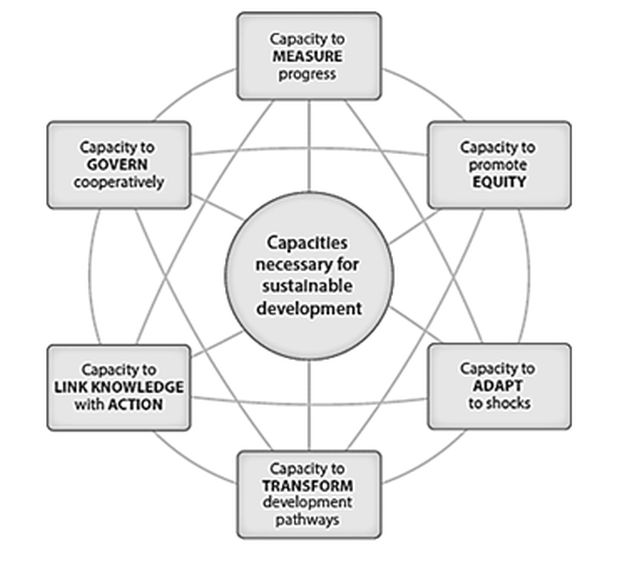- with readers working within the Healthcare industries
- within Environment, Consumer Protection and Tax topic(s)
Justina Olayinka1
Strategies for Achieving Sustainable Development Goals
1. Building Strategic Business Partnerships to enhance capacity for sustainability in hard times2
Organisations often collaborate on business ventures during challenging times to address various difficulties. This collaboration involves recognising and addressing the specific challenges and needs of different business units and departments, which is essential for supporting and achieving organisational goals.
In Nigeria today, as organisations face difficult economic conditions, organisations often merge to overcome business challenges. For example, they combine resources to enhance production in large quantities, make effective use of power supply, and strive to meet evolving client demands. Executive teams work closely with departmental heads to develop and implement strategies that lead to successful outcomes. Management and business partners must operate like professional consultants, addressing both tactical and strategic issues to promote and grow the organization.
Furthermore, organisations partner with other organisations, government bodies, and NGOs to share resources, knowledge, and expertise. This ensures the organisation maintains its standards and produces standardised products and services for clients.
1.2 Importance of Collaboration and Partnerships
Collaboration3 in an organisation involves working together with others to achieve a common goal. In this setup, individuals or teams share knowledge, skills, and resources, focusing on a specific project or task. It's more about pooling resources and expertise, while maintaining independence in other aspects of their work. Collaboration can happen between two people or many, and the relationships can range from strangers to best friends.
Partnership, on the other hand, is a more formalized relationship akin to a marriage. It involves mixing finances, resources, and responsibilities, and making joint decisions on managing these aspects. Partnerships require a higher degree of commitment and trust, as both parties share in the risks and rewards.
In essence:
- Collaboration: Is a shared effort towards a specific project, maintaining individual or firms' independence.
- Partnership: Is a formal, ongoing union with shared financial and operational responsibilities amongst firms.
Nevertheless, in Nigeria's current challenging economic climate, many businesses are closing or exiting due to the abnormal rise in production and service costs. High maintenance costs, labour wages, and other expenses have significantly reduced profits, with some organisations even operating at a loss. In response, many businesses, particularly in the banking sector, have reduced their workforce in favor of automation and technology. The many industrial sectors, including but not limited to the oil and gas sector, maritime sector, FMCGs etc., often employ staff on contracts to avoid paying full emoluments.
Additionally, a significant number of highly skilled employees have migrated abroad in search for better opportunities, further reducing the workforce and creating vacancies across various sectors.
Given these challenges, many managers have shifted their focus from running businesses single-handedly to building partnerships and collaborating with organisations that share similar visions, including government enterprises. By leveraging additional resources and expertise, these collaborations can help sustain operations and enhance the capacity to implement sustainable development practices effectively.
Organisations often merge or form partnerships whenever the country's economy is nose-diving for the following reasons:
- Cost Savings: Organisations collaborating, combining and sharing resources together automatically reduces operational costs through economies of scale and eliminating redundancies because employees will always have work to do.
- Innovation: During hard times organisations collaborating can foster innovation by combining expertise and technology together which will eventually lead to new solutions and products. However, collaborative efforts encourage communication across different areas, fostering the exchange of insights and innovative solutions that may not arise in isolation.
- Access to Capital: Organisations who join forces together can improve access to financial resources, making it easier to weather economic downturns and to continue to provide quality services and products to clients inspite of the increased costs. By sharing resources, organizations can enhance efficiency and productivity, leveraging each other's strengths.
- Market Position: By combining their strengths, organizations can respond more swiftly to market changes, adapting their strategies as needed. Partnerships help organisations strengthen market presence, allowing organisations to better compete against larger rivals.
- Diversification: Understanding the diverse needs of various units ensures that collaborative efforts align with overall organisational objectives, enhancing focus and impact. Partnerships help organisations to go into diversifying offers and services, reducing dependence on a single product or market.
- Risk Sharing: By pooling resources, organisations can share risks associated with market fluctuations and economic uncertainties.
2. Stakeholder Engagement
Currently organisations should regularly update stakeholders by providing regular financial updates to keep them informed about the organisation's financial status and also engage stakeholders in financial planning and decision-making processes to ensure their needs and perspectives are considered. Organisations should promote transparency to stakeholders, providing regular report about the states of things, and whether the company is making a profit or incurring losses. There should be consistent communication between the organisation and stakeholders in order to achieve sustainability goals and achievements, they should also ensure that trust is promoted while encouraging collective action.
3. Engaging Employees in Sustainability
There is a need for an office support system which ensures that employees have access to mental health resources and office support, fostering a resilient staff. Collaboration fosters a sense of community and shared purpose, which can improve employee engagement and morale during tough times.
However, organisations should cultivate a sustainable mindset in-house by engaging employees in eco-friendly initiatives and empowering them to contribute to decision-making processes. Also, by empowering Teams, including employees, in the decision-making process and encouraging ownership over their roles, this can lead to higher motivation and innovation.
4. Monitoring and Evaluation
Due to the hard times and poor economy in the country, HR should regularly implement healthy monitoring and evaluation systems to track employee progress and make necessary adjustments as needed. Secondly, HR should conduct regular assessments to evaluate the effectiveness of sustainability initiatives. This helps ensure that sustainable development activities are effective and can be scaled or modified as needed for continuous employee's assessment and appraisal. Lastly, HR should implement feedback mechanisms to continuously improve sustainability practices based on stakeholder input.

Diagram of Capacities for Sustainab4le Development.4
There are Six interdependent Capacities necessary for organisations both in the short and long term, and organisations should strive to develop the following capacities to enhance sustainability, regardless of unfavourable economic conditions: -
- Measuring progress
- Governing cooperatively
- Linking Knowledge with action
- Transforming development pathways
- Adapting to shocks
- Promoting equity amongst Staff
- Measuring the capacity to progress
Conclusion
To sustain development during challenging times, organisations must collaborate to address common obstacles like declining sales or supply chain issues. For manufacturing organisations, managers often partner with suppliers who prioritize sustainability, creating a network of resilient and ethically-minded businesses. Similarly, service providers, such as law organisations, should collaborate with other organisations in their field to enhance service quality for clients.
In summary, organisations should adopt eco-friendly practices and collaborate with other organisations to pool resources. This strategy helps mitigate the impact of inflation on production and service provisioning, reduces negative environmental impact, and promotes sustainable resource management for long-term viability.
Footnotes
1. See, https://www.linkedin.com/pulse/5-key-skills-managing-human-resources-challenging-times-phd accessed 16th October 2024.
2. See, https://blog.webex.com/collaboration/what-is-collaboration/ accessed on 6th November 2024.
3. See, https://www.researchgate.net/figure/Capacities-for-Sustainable-Development-Six-interdependent-capacities-are-necessary-for_fig3_343418376 accessed on 6th November 2024.
4. See, https://www.researchgate.net/figure/Capacities-for-Sustainable-Development-Six-interdependent-capacities-are-necessary-for_fig3_343418376 accessed on 6th November 2024.
The content of this article is intended to provide a general guide to the subject matter. Specialist advice should be sought about your specific circumstances.


